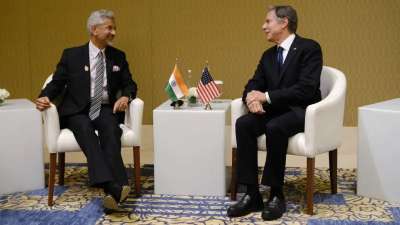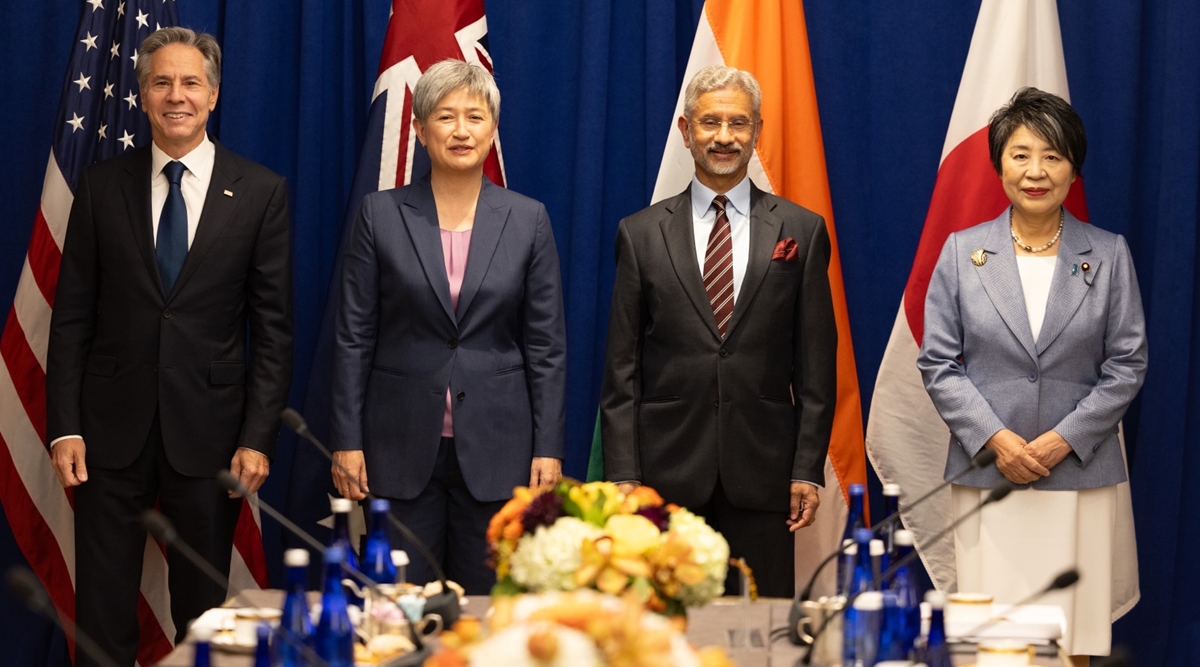India-U.S. Diplomatic Meeting: Jaishankar and Blinken Discuss Khalistan Row

India-U.S. Diplomatic Meeting: Jaishankar and Blinken Discuss Khalistan Row
In a significant diplomatic development, India’s External Affairs Minister, S. Jaishankar, met with United States Secretary of State Antony Blinken today, amidst growing tensions surrounding the India-Canada Khalistan controversy. The meeting comes in the wake of Canada’s allegations concerning India’s involvement in the assassination of Khalistani terrorist Hardeep Nijjar.
The United States, a key global player, has not only facilitated dialogue between the two nations but has also reiterated its position on the issue. Matthew Miller, the spokesperson for the U.S. State Department, affirmed that the United States had already communicated its stance to both India and Canada. He emphasized that the U.S. was encouraging India to cooperate with Canada’s ongoing investigation into the matter.
The escalating Khalistan row has put India’s diplomatic skills to the test, as it navigates its relationship with Canada while also engaging with its strategic ally, the United States. This article will delve into the nuances of this diplomatic conundrum, offering an overview of the Khalistan issue, the role of the United States, and the implications for India’s foreign relations.

The Khalistan Conundrum
The Khalistan movement, a separatist Sikh movement seeking an independent Sikh state, has been a contentious issue for decades, with Canada serving as a prominent hub for Khalistani activities. Hardeep Nijjar, a prominent figure in the Khalistan movement, was recently assassinated in Canada, leading to allegations of Indian involvement. This incident has intensified tensions between India and Canada, with the latter demanding answers from the Indian government.
The U.S. Position
The United States, known for its influential role in global affairs, has not remained a bystander in this matter. Matthew Miller, the State Department spokesman, reiterated that the United States had a clear stance on the issue. While not explicitly stating their position, it is widely understood that the U.S. seeks a peaceful resolution to the conflict and encourages cooperation between India and Canada in the investigation.
Diplomatic Dialogue in Washington
The meeting between Jaishankar and Blinken in Washington is of paramount importance as it signifies a diplomatic effort to address the escalating tensions. The use of diplomatic channels underscores both nations’ commitment to resolving this issue peacefully.
Implications for India’s Foreign Relations
India’s handling of the Khalistan row is significant not only for its relations with Canada but also for its broader foreign policy objectives. India enjoys robust diplomatic ties with both the United States and Canada. Balancing its relationships with these two nations, particularly in the face of such a sensitive issue, is a diplomatic challenge.
The Power of Diplomacy
The use of diplomacy as a means of conflict resolution is often underestimated. It is a powerful tool that enables nations to navigate complex and contentious issues. In the case of the India-Canada Khalistan row, diplomacy becomes paramount in preventing a further escalation of tensions.
Challenges Faced by India
India faces several challenges in managing this diplomatic crisis. Firstly, it must address the serious allegations made by Canada regarding its involvement in Hardeep Nijjar’s assassination. These allegations have the potential to strain India’s relations not only with Canada but also with the Sikh diaspora worldwide.
Secondly, India must engage with the United States, its strategic ally, while also considering its relations with Canada. Striking the right balance between these two relationships is no small feat, as both are crucial for India’s geopolitical interests.

The United States as a Mediator
The United States’ involvement in facilitating dialogue between India and Canada showcases its role as a global mediator. It has a history of brokering peace talks and facilitating diplomatic resolutions in various international conflicts.
U.S. Encouragement for Cooperation
Matthew Miller’s statement, reiterating the U.S.’s encouragement for India to cooperate with Canada’s investigation, demonstrates the United States’ commitment to a peaceful resolution. The U.S. is, in essence, urging India to be transparent and cooperative in addressing Canada’s concerns.
The Broader Implications
Beyond the immediate diplomatic tensions, this episode has broader implications for India’s global image. How India manages this situation will influence its standing on the global stage, especially in the eyes of countries that closely follow developments related to human rights and separatist movements.

The Geopolitical Ripple Effect
Beyond the immediate diplomatic circles, the India-Canada Khalistan row sends ripples throughout the geopolitical landscape. The Sikh diaspora, primarily spread across North America, Europe, and Southeast Asia, plays a significant role in the Khalistan movement. Consequently, how India handles this situation not only impacts its relations with Canada but also resonates within these diaspora communities.
For India, it is crucial to maintain open lines of communication with these communities, fostering a sense of trust and cooperation. This task involves not only dispelling any suspicions regarding its involvement in Nijjar’s assassination but also addressing the concerns of the Sikh diaspora who have been advocating for Sikh rights and Khalistan’s independence.
Global Human Rights Scrutiny
The allegations surrounding India’s role in the assassination of Hardeep Nijjar also bring global human rights scrutiny into the spotlight. India, as the world’s largest democracy, is subject to intense international scrutiny when it comes to issues related to human rights, minority rights, and religious freedoms. Any perceived violations of these principles can lead to damage to India’s international reputation and affect its diplomatic relations with various nations.
India must engage in transparent and credible investigations into the allegations while upholding its commitment to human rights and the rule of law. This approach can help mitigate the impact of such allegations on its global image.
The Role of Diplomacy in Conflict Resolution
The India-Canada Khalistan row underscores the significance of diplomacy as a tool for conflict resolution in today’s interconnected world. While public statements and posturing may grab headlines, behind-the-scenes diplomacy often holds the key to resolving contentious issues. The meeting between Jaishankar and Blinken serves as a testament to this fact.
Conclusion
As External Affairs Minister S. Jaishankar meets with U.S. Secretary of State Antony Blinken in Washington to discuss the India-Canada Khalistan row, the world watches closely. Diplomatic efforts to address the escalating tensions between India and Canada are in motion, with the United States playing a pivotal role in facilitating dialogue.
The power of diplomacy is evident, as it provides a pathway for nations to peacefully navigate complex issues. For India, this diplomatic conundrum presents both challenges and opportunities. Striking a balance between its relations with Canada and the United States while addressing serious allegations is no small task. As the situation unfolds, the world waits to see how these diplomatic efforts will shape the future of India’s foreign relations and its global standing.




